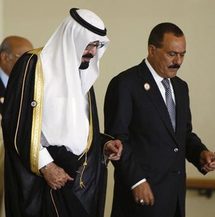Middle East boils with Libya strikes, Yemen on brink
AFP
SANAA- The Middle East boiled on Monday after fresh air strikes in Libya, a mass protest in Syria, and Yemen on the brink after top generals backed protesters battling to overthrow President Ali Abdullah Saleh.
Tanks deployed in key locations across Yemen's capital Sanaa including at the presidential palace, the central bank and the ministry of defence, but it was unclear what their orders were or who was in command.

"The crisis is getting more complicated and it's pushing the country towards violence and civil war," the general said in a statement.
"According to what I'm feeling, and according to the feelings of my partner commanders and soldiers... I announce our support and our peaceful backing to the youth revolution.
"We are going to fulfil our duties in preserving security and stability."
Ahmar was followed by fellow generals Mohammed Ali Mohsen, the Eastern Military district chief, Nasser Ali Shuaybi in Hadramawt province and Faisal Rajab in the southern province of Lahij.
Dozens of officers of various ranks went to the tent city near Sanaa University, where demonstrators have kept vigil since February 21 in spite of a wave of attacks, and publicly pledged to support the revolution.
The deputy speaker of parliament, Himyar al-Ahmar, and the governor of the key southern province of Aden, Ahmed Qaatabi, also resigned in protest at the treatment of demonstrators.
Sadiq al-Ahmar, who leads the Hashid tribal federation, the largest in deeply tribal Yemen and a crucial source of Saleh's power, told Al-Jazeera it was time for the embattled president to make a "quiet exit."
In Cairo, Saleh's envoys to Egypt and the Arab League, Abdel Wali al-Shemiri and Abdel Malek Mansur, also abandoned him and "joined the revolutionaries," a diplomat told AFP on condition of anonymity.
The defections came a day after Saleh sacked his cabinet in a bid to placate opposition calls for sweeping reforms in the key US ally.
The regime has already lost the support of religious leaders and been weakened by the resignations of ministers, ambassadors and a host of ruling party MPs, but Saleh has refused to stand down until his term ends in 2013.
He said Monday the majority of the people were behind him.
His regime was internationally condemned after more than 50 people were killed when loyalist gunmen opened fire Friday on protesters in Sanaa's University Square, the centre of the pro-democracy movement.
The defection of top officers to the opposition is likely to complicate Washington's support for Saleh, whom it sees as a pillar of stability in a volatile country and a partner in the war against Al-Qaeda.
UN Secretary General Ban Ki-moon, speaking in Cairo on Monday, strongly condemned the use of live ammunition against demonstrators in Yemen, and repeated international calls for dialogue and restraint.
In Syria thousands marched for the fourth straight day in the southern town of Daraa, after the funeral of a protester killed in the previous day's demonstration when security forces opened fire, a resident said.
Also on Monday, an 11-year-old boy caught up in Sunday's protests died of tear gas inhalation, a human rights activist said.
Washington condemned the crackdown, accusing Damascus of using "disproportionate force" against protesters.
"Just God, Syria and Freedom," and "Revolution, revolution" chanted the demonstrators on Monday, according to the resident who said security forces used tear gas and made several arrests in a bid to break up the protest.
The protesters, who have been inspired by regime-changing revolts in Tunisia and Egypt, are demanding "freedom" and an end to 48 years of emergency laws in Syria under President Bashar al-Assad and his father Hafez.
In Libya, Western forces launched new air strikes as Moamer Kadhafi's Tripoli compound was again rocked by blasts on Monday and his southern strongholds and a navy base were targeted.
Overnight on Sunday, a building in Kadhafi's Tripoli compound was flattened.
Witnesses said a Libyan navy base at Bussetta some 10 kilometres (six miles) east of Tripoli was also bombarded on Monday.
A Libyan government spokesman, Mussa Ibrahim, told a Tripoli news conference coalition warplanes on Monday also targeted the southern town of Sebha, bastion of Kadhafi's Guededfa tribe.
Ibrahim also claimed that Misrata, Libya's third city 214 kilometres (132 miles) east of Tripoli, was "liberated three days ago" and that Kadhafi's forces were hunting "terrorist elements."
A rebel spokesman reached by telephone in Misrata insisted the insurgents remained in control.
Arab League Secretary General Amr Mussa said in Cairo on Monday he fully supported UN Resolution 1973, adding that his comments the previous day that the air strikes exceeded the UN mandate had been "misinterpreted."
Mussa said his earlier criticism had been motivated by concerns about civilians being caught up in the coalition strikes, as Arab governments did not want to see more deaths in Libya.
The UN's Ban, speaking at the Arab League headquarters, said: "It is important that the international community speak with one voice" to implement the resolution.
But Russian Prime Minister Vladimir Putin Monday slammed the UN resolution -- which Moscow declined to veto at the Security Council -- as a "mediaeval call to crusade" and slammed Washington for its readiness to resort to force.
In a fourth regional hotspot, Bahrain's King Hamad said the monarchy had foiled a "foreign plot" against Gulf countries, "prepared over a period of 30, maybe 20 years."
He was speaking to officers of a Saudi-led Gulf Cooperation Council force invited into Bahrain last week ahead of a crackdown on pro-democracy protests in the Shiite-majority country that is ruled by a Sunni dynasty.
The interior ministry said that security across the kingdom was "stable" amid a heavy police presence, despite the opposition announcing two new Shiite fatalities.
------------------------------------------------------------------------